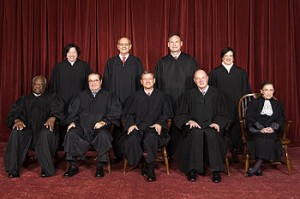ANALYSIS: Gay Marriage’s ‘Roe vs. Wade’ Moment On the Way?
The fight over gay marriage may be about to reach its most pivotal moment in our nation’s history.
Today the United States Supreme Court announced that it will take up two cases on the subject next year. One involves California’s voter-approved “Proposition 8” ban on gay marriage, and the other may have a direct impact on the controversial 1996 “Defense of Marriage Act” (DOMA).
Assuming the court decides to face the issue head-on, its ruling could be the “Roe vs. Wade” moment of the gay marriage debate.
In 1996, then-President Bill Clinton signed the “Defense of Marriage Act” (DOMA) that officially defined marriage as “a legal union between one man and one woman as husband and wife.” This had major consequences for gay couples, even those in state-approved civil unions and marriages.

Gay marriage advocates argue civil unions don’t offer enough protections under the law. Image courtesy University of Iowa.
Although Hawaii’s civil unions law (in effect since January of 2012) effectively grants same-sex couples all the legal benefits of marriage, it only does so for matters of state law. This means that for gay couples, virtually anything having to do with federal tax and estate matters is still held hostage to DOMA.
Under federal law, straight married couples can transfer assets back and forth without being hit with tax consequences. Gay couples on the other hand, face the same restrictions as single persons, with a $13,000 per year “gift limit.” DOMA helps to assure that anything “gifted” in excess of that amount will be subject to federal taxation.
But it is the federal estate tax, opposed strongly by many conservatives, which may end up dooming DOMA once it goes before the nation’s highest court.
Married straight couples are currently exempt from estate taxes. That means no matter how large the estate, if one spouse dies, everything will be transferred to the survivor tax-free. Not so for gay couples, as DOMA specifically states that “any Act of Congress, or…ruling, regulation, or Interpretation” recognizes only straight couples in all aspects of federal law.
Of the two cases being heard in 2013, it is a ruling by the US Court of Appeals for the 2nd Circuit that directly challenges the Defense of Marriage Act. In October, the appeals court issued a 2-1 ruling that collecting estate taxes from a gay couple without doing so for a straight couple was unconstitutional.
Starting in 2013, assuming congress does not intervene, estate taxes will kick in for non-spouses inheriting over $1 million in assets. Of course, under DOMA, even married gays will be subject to the same estate tax rules as singles.
Whether or not the nation’s highest court directly confronts the issue of DOMA, it’s worth remembering that regardless of the outcome, gays will technically be no worse-off in the court’s eyes, regardless of what decision (or lack of one) the justices reach.
But the upcoming hearings represent an opportunity to take the debate over gay marriage out of the hands of politicians, and out of the mouths of blowhards. For at least a few moments, the issue will be surrendered to nine judges, and our constitution.











